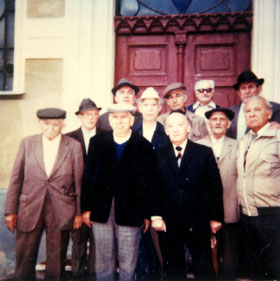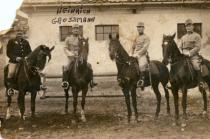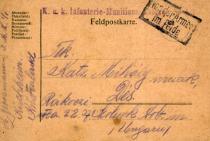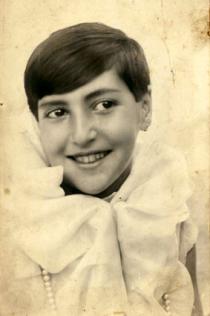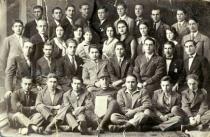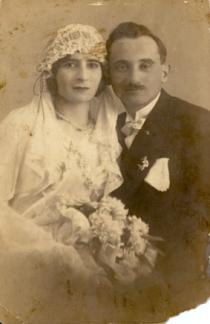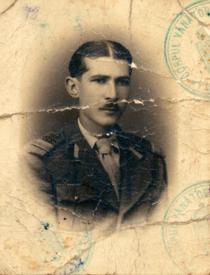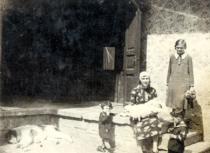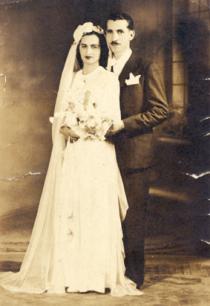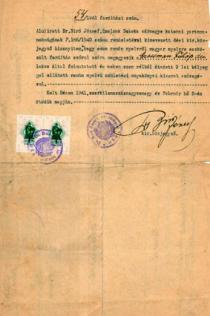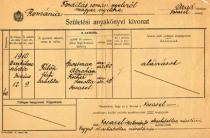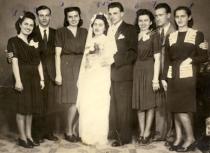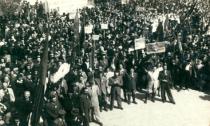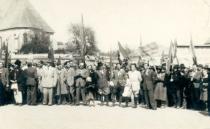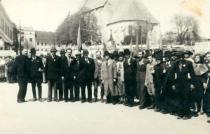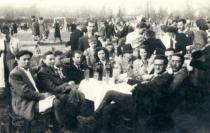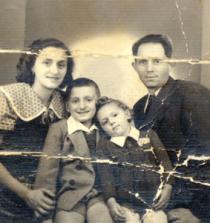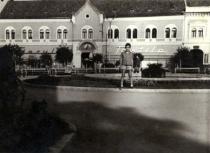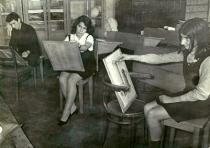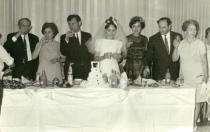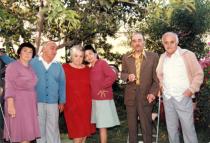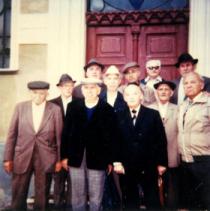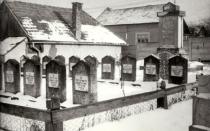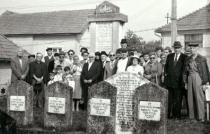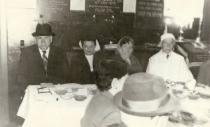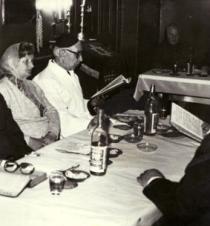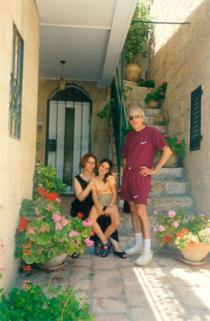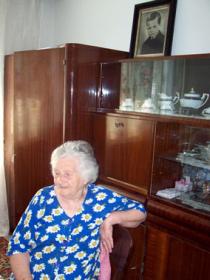These were the old Jews from Des. The first on the right in the first line is Edmund Hirsch, next to him is Kleinmann, he was an old Jew who didn’t have any family. Behind Hirsch is Elek Mund, the second from right is Giesenstein, next to him on the left is standing Sanyi [Sandor] Polover, before Polover [in the first line, in black suit] you see Emil Nasch, on his left side, in the center [a little behind, in the second line] is my husband [Fulop Grossmann], in front of my husband, on the left is Ignac Dicker - he was the community leader at that time -, behind him is Goldstein, on the left side is Altmann, who died in the home for elderly, behind him, on the right is Herman Nemes, who was bringing and distributing the kosher meat from Kolozsvar. Only Hirsch is alive among these men, all the others are dead.
Nowadays we go to Kolozsvar on holidays, at least for Pesach. The Bilbaum boy [member of the Jewish community of Des] takes me. We used to observe Pesach here in Des, while my husband was alive, and recited the Seder [conducted the Seder night ritual]. After my husband died [in 1994], we kept on observing, but nobody recited the Seder [there wasn't anybody to conduct the ritual]. We just ate the egg, drank some wine, and we concluded that it made no sense like that. There is no Jewry in Des. It died out. There were very religious people in Des, they recited the prayers very well. They died, they died out. This generation has no other destiny than extinction. They are all old. Recently Mrs. Bilbaum died. It's only me and Ella Motlai who are left among women. And there is one more Jewish woman, whose father and mother were Jews, but her parents didn't observe anything, so she doesn't know anything on Jewry, she doesn't observe anything. So it's only me and Ella, who know something on Jewry. If we take men, there's Hirsch - his wife, Livia works at the Jewish community, she's Romanian -, he's well up in it, he comes from a religious family, and Farkas [Editor's note: Jozsef Farkas, Centropa interviewed him as well], he also comes from a religious family. The two of them know what Jewry consists of, what a Jewish household is. But neither Farkas, nor Hirsch have Jewish wives, so there is nothing Jewish in their homes. It's the woman who maintains Jewry at home.
My husband knew many things on Jewry. He could do 'lajnolas' [K'riat HaTorah, reading the Torah] as well. It is a very hard prayer, just a few know it Romania, he knew it. My husband had as much knowledge as a rabbi. He knew everything about the Torah, everything. He came from a very religious family, his father was one of the most religious men in Des. His father didn't come to this synagogue, they had a separate synagogue, a Hasid one. My husband could read from the age of four. He was four years old, and his father took him out from the bed to learn, to read. My husband wasn't Hasid, but he had a great knowledge, since he was a very intelligent man, he could comprehend everything very easily. He attended only the cheder, but he learnt individually. He knew as much as a yeshiva student. Everybody was wondering how he knew so much on Jewry. He was always learning. He knew everything. But these communist ideas came after the war, so he switched [took on from the communist ideas], he didn't observe it [religion] anymore. But he regretted it deeply when he got old. It hurt him a lot that he became estranged. He felt very much annoyed for having left religion. He had his prayer book in his hands the whole after-noon, each day. He realized finally that he belonged to Jewry. Especially when blows hit us, when Erika fell ill, he [my husband] fell ill as well, and it was then that he realized that one shouldn't abandon the Jewish religion, and one shouldn't become estranged from Jewry. He kept on saying that: 'I quitted religion, and blows came. We abandoned the religion, maybe that's why blows are hitting us.' I always said that one shouldn't abandon their faith. Can it be a good or a bad religion, but we were born in it, we have to carry it on.
[In his declining years] He was the soul of the synagogue. He was proficient, he could read everything from the Torah, he knew the explanation for everything, the reason for everything. It was always him who read out from the Torah, who prayed. When he got old, he was always reading and learning at home as well. He had large books; I brought a lot of these to the synagogue, so that if I die, they won't get lost. But I still have a few I don't want to squander. My husband was a very clever man. You have to give it to him. He had a wonderful handwriting, he could bind books marvelously, everything he put his hands on was done, he was so good with his hands. I had a shabby prayer book, he bound it so skillfully. He rebound many of our books, and he rebound the books in the synagogue as well at his old age.
If my husband were alive, we would be fine. He had a very good pension, he had fifty years [worked]. And I didn't choose his pension, I chose mine, and it's very low. [Editor's note: Edit Grossmann doesn't get any money after her husband.] Everybody tells me: 'You see, that's what you worked for.' But I had only twenty years [officially registered as working years], because unfortunately my daughter was very ill, I always had many problems, and I didn't go to work. The community helps me sometimes, and my son and my daughter helps me a little, that's what I live of.
